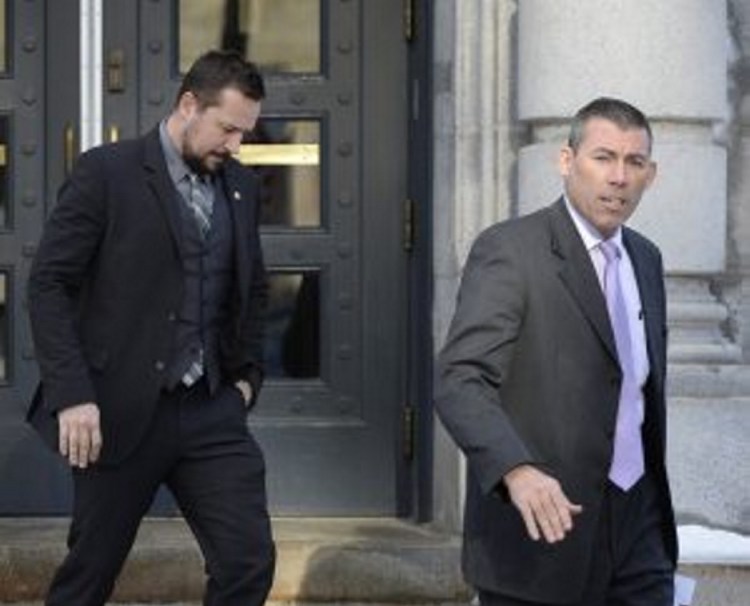Mario Ernesto Garcia-Zavala was a passenger in a van pulled over on Interstate 295 in Portland in 2017. He was ultimately detained and charged with illegally re-entering the United States despite a deportation order in 2014.
Maine State Trooper Robert Burke III testified in U.S. District Court in Portland last year that he stopped the van of Spanish-speaking men because it had a cracked windshield and the front passenger was not wearing a seat belt. But defense attorney Robert Andrews argued that the trooper was more concerned about the passengers’ immigration status than the traffic violations, and he has been asking the courts to suppress evidence and dismiss the case.
Andrews presented clips of police video of the traffic stop to try to make his case about racial profiling in the Maine court last year. But the judge in that case ruled that the traffic stop was legal, leading to the appeal.
The video of the traffic stop mostly captures conversations between Burke and Trooper Jay Cooley, in which they can be heard ridiculing the passengers and referring to them as “disgusting” and “sketchy.” The video also shows Burke calling an immigrant agent just minutes into the traffic stop.
Warning: Video contains graphic language.
“This is the (expletive) ICE motha load right here,” Burke tells Cooley when he arrives as backup. “Fourteen of ’em. Not one of them speaks English. Drivers – No driver’s licenses. ICE is gonna be coming out here with their (expletive) SWAT team on this one. I just need you to watch them. They’re all (expletive) sketchy as hell.”
ICE is the acronym for U.S. Immigration and Customs Enforcement. With evidence Burke gathered, Garcia-Zavala was convicted of entering the United States after being removed or deported. Andrews then challenged the judge’s decision to deny his motions to suppress and dismiss in the 1st U.S. Circuit Court of Appeals in Boston, and a panel of three judges heard oral arguments in the case Tuesday.
“Even assuming accuracy of Trooper Burke’s cracked windshield and no seatbelts justification, Trooper Burke almost immediately changed his focus to the immigration status of the men,” Andrews wrote in his appeal brief. “The problem is that none of the factors relied on by Trooper Burke are permissible under our law as a basis for suspicion. Ancestry alone is not a basis (for) making a stop or investigating. Appearing Hispanic is also not a basis for reasonable suspicion.”
The prosecutor, Assistant U.S. Attorney Julia Lipez, challenged Andrews’ timeline of events and said the trooper did not violate Garcia-Zavala’s rights during or after the traffic stop. She added that Garcia-Zavala’s presence in the United States continued to be against the law.
“Even in the case of full suppression of the evidence and dismissal of the indictment, Garcia-Zavala would have been subject to re-arrest immediately upon release,” Lipez wrote in her own argument.
One of the three judges who heard the appeal arguments is from Maine – Judge William Kayatta. Justice David Souter, who is from New Hampshire, retired from the U.S. Supreme Court but still hears cases in federal court on occasion. The third was Judge Susan Lynch, who has spent most of her career in Massachusetts.
The panel asked the attorneys at oral arguments about probable cause and immigration records.
“The stop has acquired a second purpose, which materialized once he found the circumstances of the people on the bus,” Souter said to the defense attorney. “I mean, no one spoke English. I think the driver was unlicensed, as I recall. There was certainly, at that point, reason to say, is there an immigration violation going on here? And he acted, I would suppose, within reasonable limits of time in pursuing that second and new issue.”
“I would disagree with you, Justice Souter,” Andrews responded. “And the reason I disagree with you, the reason is that it’s not permissible to assume a nonwhite person who does not speak English is an immigrant.”
“That may be, but a vanload with no one who speaks English and an unlicensed driver, something is unusual about that,” Souter said.
There is no timetable for the appeals court to rule on the case.
Correction: This story was updated at 12 p.m. Monday, March 11, 2019, to correct the spelling of Julia Lipez’s name.
Comments are not available on this story.
Send questions/comments to the editors.


